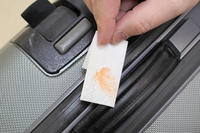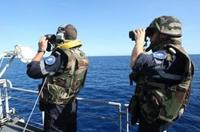-
Australia’s disasters cost insurers $25.6 billion
The series of disasters that struck Australia this year including the Queensland floods, Cyclone Yasi, and the New Zealand earthquake has hit local insurers particularly hard with a combined loss of $25.6 billion
-
-
Securing financial infrastructure against cyberattacks
To protect the U.S. financial sector from increasingly ubiquitous and costly cyberattacks, DHS plans to work more closely with other federal agencies as well as the private sector to defend against hackers
-
-
Valley Forge, Livermore agree on explosive detection patents
Last Thursday Valley Forge Composite Technologies, Inc. announced that it had just reached an agreement with Lawrence Livermore National Laboratory for several key technological advances in hidden explosive detection
-
-
U.S. Army buys Raptor's MIPs-based detectors

Molecularly imprinted polymers (MIPs) technology is capable of selectively sensing microscopic amounts of explosives or other molecules that are dangerous for humans and the environment, such as toxins, chemical agents, biological agents, pesticides, and poisons; the U.S. Army wants more MIPs detectors
-
-
Teal Group: global UAV market to total $94 billion in the next ten years

Unmanned Aerial Vehicles (UAVs) have been the most dynamic growth sector of the world aerospace industry this decade; a new market study estimates that UAV spending will almost double over the next decade from current worldwide UAV expenditures of $5.9 billion annually to $11.3 billion, totaling just over $94 billion in the next ten years
-
-
U.S. intervention hinders disaster recovery, says reinsurance giant
Lloyd’s of London, the largest reinsurer of U.S. risk, said the federal government’s intervention in the insurance market could hinder recovery efforts following natural disasters; “We don’t believe that the U.S. has the balance between industry and government intervention right, you have government intervention in federal and state level, it demonstrates this is not a sustainable way to proceed,” said Lloyds general counsel
-
-
Disaster scams on the rise
In the immediate aftermath of natural disasters, fraudsters have increasingly rushed in to take advantage of the outpouring of charitable donations; speaking on a panel at an international symposium on organized fraud in Australia, the Department of Justice’s deputy chief for strategy and policy in the Fraud Section of the Criminal Division, said scammers had websites for fake charities in place before predicted disasters had even hit
-
-
InfoZen wins $90 million ICE contract
On Monday InfoZen announced that it had won a $90 million five-year contract with U.S. Immigrations and Customs Enforcement (ICE) to provide IT services
-
-
SmartMetric set to release new biometric smart card
In the first quarter of 2012, SmartMetric, Inc. plans to unveil its newest SmartCard, which is the size of a standard credit card but has the ability to record fingerprint biometrics to ensure the highest level of security in financial transactions
-
-
iBeta becomes NIST approved biometrics test lab
With the increasing ubiquity of biometrics in everything from airport scanners, laptops, cell phones, hospitals, and vehicles, iBeta Quality Assurance recently gained official certification to test new biometric technologies
-
-
Counter piracy security expert: "The system is broken"

Piracy off the Horn of Africa has continued to flourish despite the concerted efforts of the world’s navies; a security expert said, “The system is broken here” and called the international counter piracy task force “one of the most expensive catch and release programs” ever; last year the task force spent more than $2 billion responding to sixty-four incidents, or roughly $30 million per incident
-
-
Strong growth for mobile phone embedded biometric security solutions
New study says that the conditions are now right to create a strong market for mobile phone embedded biometric security solutions; the current global user base of four million users in 2011 is set to grow to 39 million users by 2015
-
-
U.S. and Belgium to share biometric data
Under a recently signed agreement, the United States and Belgium will begin sharing biometric data in an effort to combat international crime
-
-
AOptix shows dual iris-face scanner
AOptix is showing the latest addition to its family of biometric products, the InSight Duo, which the company describes as “the world’s first biometric system with simultaneous ISO standards-compliant iris and face capture”
-
-
Infantry now has ultra lightweight portable mine clearance system
A new mine-clearing system from light weight and portable; its cost minimized by its modular design — which means that users only need to replace consumed module such as the rocket delivery unit rather than the entire system
-
More headlines
The long view
Factories First: Winning the Drone War Before It Starts
Wars are won by factories before they are won on the battlefield,Martin C. Feldmann writes, noting that the United States lacks the manufacturing depth for the coming drone age. Rectifying this situation “will take far more than procurement tweaks,” Feldmann writes. “It demands a national-level, wartime-scale industrial mobilization.”
Trump Is Fast-Tracking New Coal Mines — Even When They Don’t Make Economic Sense
In Appalachian Tennessee, mines shut down and couldn’t pay their debts. Now a new one is opening under the guise of an “energy emergency.”
Smaller Nuclear Reactors Spark Renewed Interest in a Once-Shunned Energy Source
In the past two years, half the states have taken action to promote nuclear power, from creating nuclear task forces to integrating nuclear into long-term energy plans.
